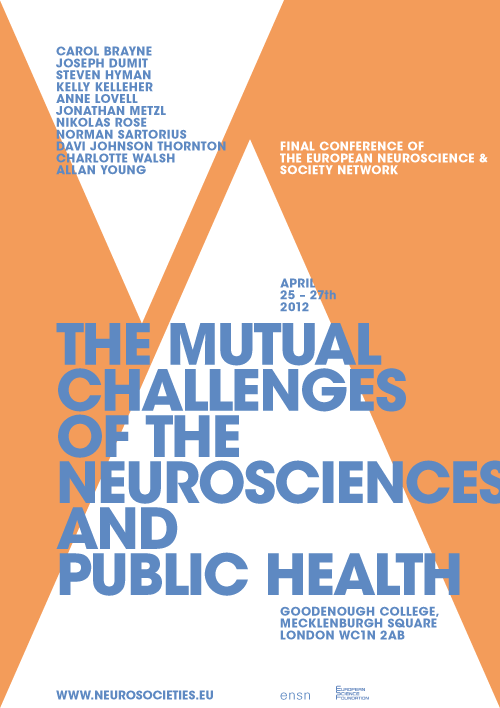THE MUTUAL CHALLENGES OF THE NEUROSCIENCES AND PUBLIC HEALTH
MECKLENBURGH SQUARE
WC1N 2AB
Carol Brayne, University of Cambridge, UK
Jo Dumit, University of California, Davis
Steven Hyman, Harvard, USA
Kelly Kelleher, Chidlren’s Institute, OH, USA
Anne Lovell, University of Paris, France
Jonathan Metzl, Vanderbilt University, Nashville, NT, USA
Nikolas Rose, LSE
Norman Sartorius, Johns Hopkins, USA
Davi Johnson Thornton, Southwestern University
Charlotte Walsh, University of Leicester
Allan Young, McGill University
How do emergent modes of redefining, diagnosing and treating neurological and mental disease and illness redefine what counts as a public health problem? What is the role of new medical technologies, namely imaging techniques or drugs? Consequences for the mental health field? What new categories of health problems and of patients are emerging?2. Access to and distribution of new medical technologies
Are new medical technologies in the field of mental health care and neurology generating new inequalities in access to health care? Are they associated with new forms of provision of health care and classification of patients/users? What is the role of patient associations in promoting equity of access?
Are new medical technologies in the field of mental health care and neurology generating new inequalities in access to health care? Are they associated with new forms of provision of health care and classification of patients/users? What is the role of patient associations in promoting equity of access?
3. The challenge of human rights
How are current conceptions of human rights challenged or modified by the knowledge and practices associated with the neurosciences? How are the rights of mental patients redefined, as well as notions of autonomy and dignity? How are the possibilities of intervention on conditions defined as mental or neurological seen as enhancing or threatening established rights? Is a new generation of human rights associated with the capacity for intervention in the biological make-up of human beings in the making?
4. Neuroscience and ‘biological citizenship’
How are conceptions of citizenship and of the political transformed as the biological has become a field of contention and regulation?
What are the emerging forms of governing life? What new institutions and public spaces are emerging?
5. Neuropolicy- governing through the brain
What historical, conceptual, technological frameworks have caused a neuro-centric reformulation of the individual? What kinds of circulating knowledge facilitates the identification of our ‘selves’ with the brain? What groups and types of conducts are targets of neuro-based interventions?
6. Neuroscience and global mental health
What is the current global burden of mental health care and what are the main strategies used to deal with it?
What geographical biases exist in the distribution of mental health care? What lessons can be learnt from specific national contexts?
We are particularly keen in exploring these issues in a variety of national realities and we encourage papers from non-Western countries.
Abstracts of up to 300 words should include your name, institutional
affiliation, and email address and should be sent to ensn2012@gmail.com by Jan 22nd 2012.
PLEASE CHECK THIS PAGE FOR UPDATES
The European Neuroscience and Society Network
Funded by the European Science Foundation and convened by researchers formerly at the BIOS Centre, LSE, the ENSN has been established to serve as a multidisciplinary forum for timely engagement with the social, political and economic implications of developments in the neurosciences, a field that has experienced unprecedented advances in the last twenty years.
A series of workshops and conferences, to be held in both Europe and North America, will bring together life scientists and social scientists, leading to the publication of annual volumes in international journals.
The ENSN is directed by a Steering Committee consisting of representatives from Austria, Denmark, Estonia, Finland, Germany, Netherlands, Norway, Portugal, Switzerland and the UK.
**UPCOMING EVENT**
ENSN FINAL CONFERENCE
The mutual challenges of the neurosciences and public health
London April 25-27th 2012
This is a temporary page, as the official site is under construction
The European Science Foundation promotes high quality science at a European level. It acts as a catalyst for the development of science by bringing together leading scientists and funding agencies to debate, plan and implement pan-European initiatives.

